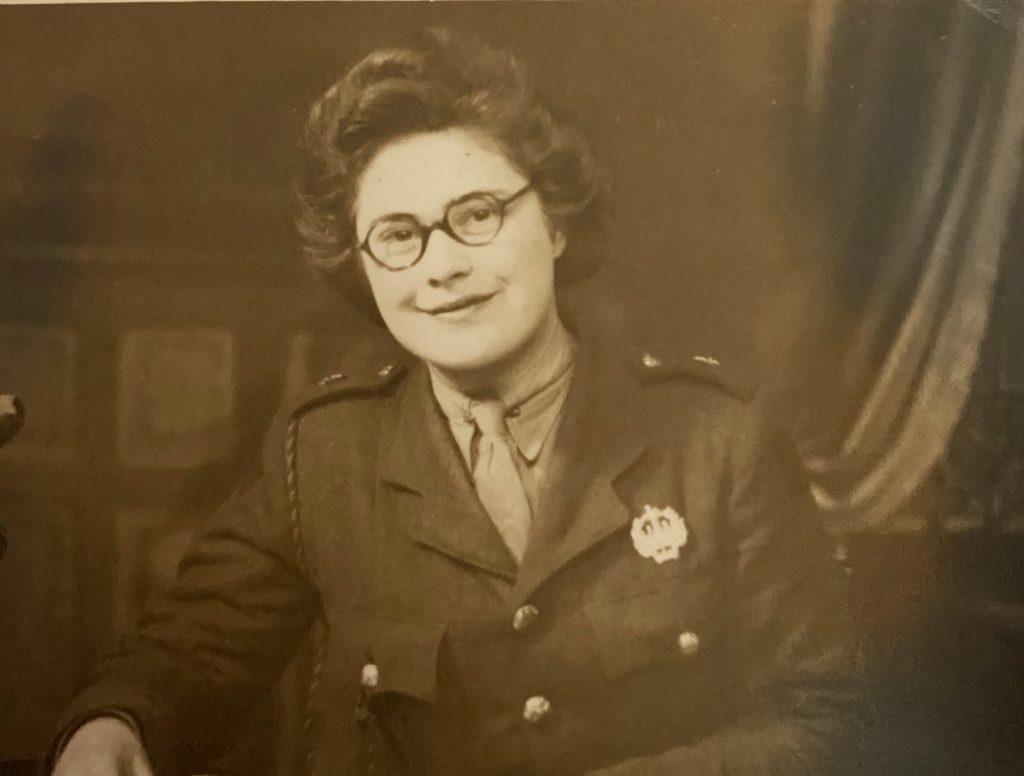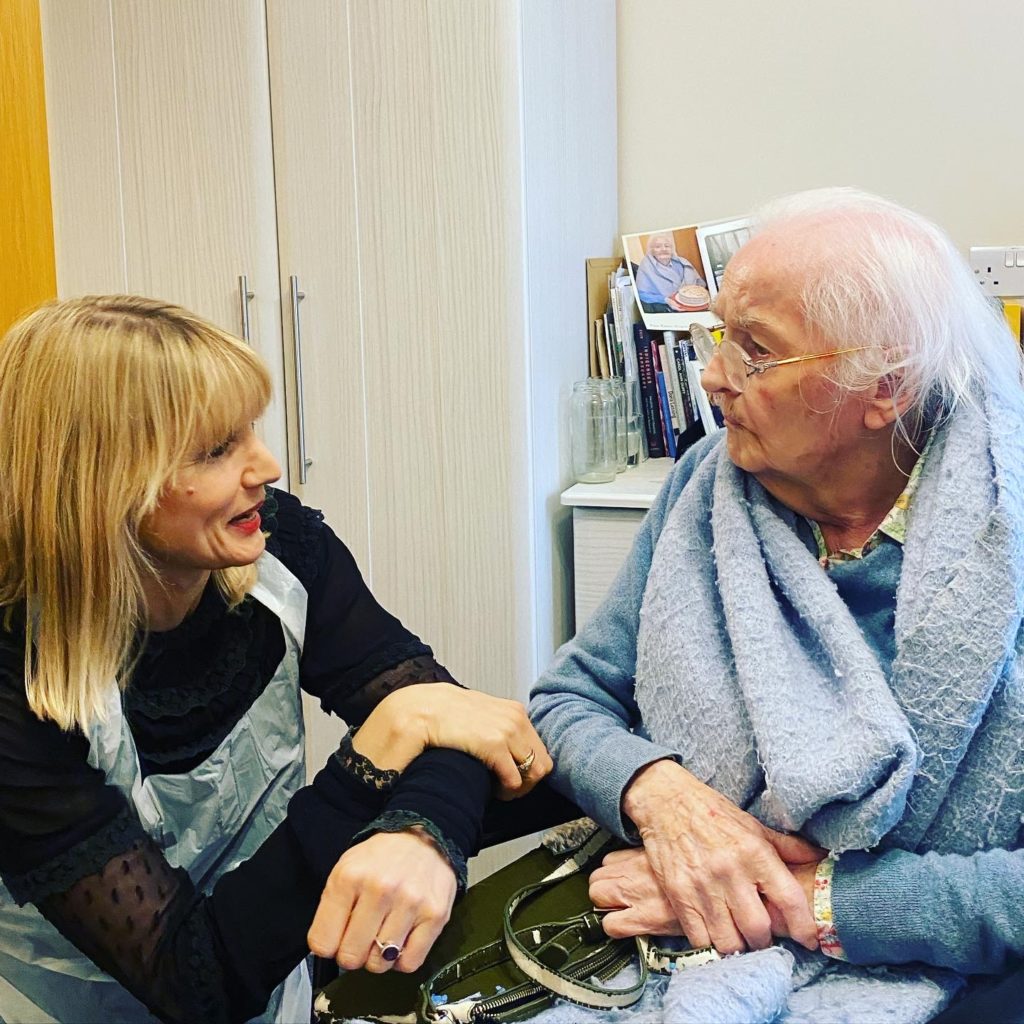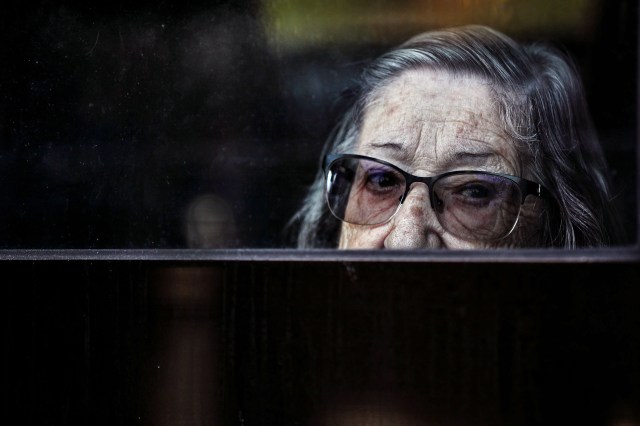Who is really afraid? The very old? Or those seeking to control them?Credit: Carlos Costa/AFP via Getty

“I just want to take a pill and make everything stop. I know I mustn’t, but I want to.” Daphne has had a tough time recently. She fell last June and broke her hip. A stint in hospital followed and then a care home, with no visitors allowed. This was no ordinary year. Within a few months Daphne was back at home, that’s when she tested positive for Covid-19. “I had a chest infection but the doctor wouldn’t come out unless I took a test.” The NHS frontline stayed as far away from Daphne as it could, and aged 98 she struggled.
“I don’t want you to come,” she told me on the telephone.
“But I’ve had coronavirus recently Daphne. I can help you.”
“Yes, but I don’t want you to see me like this. I want you to come when I’m back to normal. I’ve not told you what happened after I left 16th Searchlight Company.”
I am an oral historian. I turn old women’s stories into books and in the process sometimes I cross the professional line. It is hard not to during a pandemic working with 17 isolated veterans all of whom served in the female army (Auxiliary Territorial Service – ATS) during World War II. The youngest is 96. Our conversations are often the only meaningful communication they have from one day to the next. After pleasantries and a quick health check, I ask these women to channel their younger selves.
Returning to her restorative tonic — the war — puts the mettle back in Daphne’s voice. She is quick to remind me that she only accepts guests when her hair is fresh set and coloured (soft chestnut). “In the army they encouraged us to take care of ourselves, that was very important.”
But taking care of herself in this new ‘war’ has proved almost impossible: cut off, alone and now suffering with Long Covid, Daphne is miserable. “I’m doing my best to stay alive for you. I want to make it to the book launch, but sometimes I wish I wasn’t here.”

Army Girls is my third project involving the extreme elderly and the first written during a pandemic. My newest friends are society’s exceptional outliers, with all the research suggesting that reaching a great age takes much more than good genes. Longevity requires optimism, ambition, and multi-generational friendships. Try retaining just one of those criteria with no technology (is your great-granny on Zoom?) and no visitors, while facing down what might well be your last year on earth.
Between the first waves of Covid-19 I visited my oldest friend, Ann. She is 107, lives in a care home and is (more or less) ‘compos mentis.’ By her own admission things have slipped a bit recently. Being alone hasn’t helped. Ann was born before the start of World War I; she can still recall Union Jacks spread out in her Buckinghamshire garden on Armistice Day, 1918, flirting with communism in the Thirties and counting bacon in World War II, but she has never experienced anything like this pandemic. “I just have to accept it, what choice do I have?”
During last year’s visit, our conversation was monitored (a carer kept guard in the corner) and timed. Ann struggled to hear what I was saying, (masks are deafening when you’re old). She stared blankly at my obligatory disposable apron and muttered “it’s time they uninvented plastic.” Post-vaccine, the process of visiting remains cumbersome. For some it is a deterrent. I am shooed out of communal areas despite swathes of impersonal PPE and a negative test. Ann shrugs, “I am currently working hard on forgetting the last 18 months.” Dig deep and Ann is still there but Covid has diminished her. She’s become the personification of our reduced humanity. She can’t wait to get to the end.

Marino Plata, Ann’s care worker who is full of love and song, shakes his head. “It was too sudden; the lockdowns were too much with too little explanation.” Marino is one of the thousands of experienced health care workers who have noticed an accelerated decline in their elderly residents during successive lockdowns and restrictions. “Ann at least understood what was happening, others didn’t. They were confused and desperately missed their visitors and activities. They died sad.”
Adam Gordon is a Professor of the Care of Older People and President Elect of the British Geriatrics Society. He saw Covid-19 wreak its worst. “At the beginning of the pandemic even for an experienced practitioner like me, I was affected; early on we weren’t sure how to treat patients with the virus. I still have flash backs, I’ll spare you the gruesome details.”
Adam reminds me that when coronavirus first came knocking, Britain was shamefully unprepared. Between 20,000 and 30,000 of our vulnerable elderly died unnecessarily and horribly. This nightmare scenario led to hastily revised practice: better PPE, strict lockdowns, no visitors. Britain could not keep climbing up the Covid-19 league of shame. And sure enough, fewer very old people have subsequently died. But has their last year of life been worth living?
Do not go gentle into that good night. The prophetic words of Dylan Thomas have proved almost impossible to live up in Covid times. Old age should burn and rave at close of day. Not a chance if you’ve been locked up in your care home (or your own home), with no visitors and, crucially, no voice on the public stage.
“There’s the tension” admits Professor Gordon, “the competition between protecting people from the virus and their other needs was underestimated. It is nuanced.” And modern debate doesn’t like nuance. I was blocked and shouted down on Twitter by several influencers for querying their calls to extend the lockdown last summer. Too many only see one side of the ‘tension’ the professor talks about. After a terrible start, the restrictions Britain’s elderly had to endure were dehumanising to the point that many no longer wanted to live. ‘Deconditioning’ is the word he uses to describe their accelerated cognitive and physical degeneration.
“It’s dreadful to be alone and old,” explained another Anne. She was 96 years old and a former WWII junior commander in the ATS. Like 107-year-old Ann, she too had lived through an era when duty was the nation’s watchword; the press was censored, the people were conscripted, and hundreds of thousands of her generation died. It is that generation who have once more been in the firing line, but this time their duty was to be solitary and still. Pride is harder to wear in private. For the first time Anne watched Remembrance Day in November 2020 on television, rather than celebrating it with friends in her local church. It was a disappointing replacement. She sighed, “I wish someone would rub me out, I wish I could disappear.”
Anne was a Norfolk County Vice President of the Guide Association and mid-pandemic she reckoned that “the reason why Guiding has been so successful is that we were all involved together in our activities. Humans are built to be together.” Anne died in July 2021, most of her last year lived alone.
Professor Gordon admits that data has not been collected to track the unprecedented deconditioning that’s taken place over the last 18 months. Daily we are assailed with graphics charting Covid-19 cases and death rates, but there is no equivalent measure for the impact of loneliness, suicidal thought, feelings of abandonment and physical deterioration that the restrictions have induced in the extreme elderly. As 107-year-old Ann pointed out “I have terrible forgettery, this won’t be remembered.” Perhaps society is banking on that. When judgement day comes it will ask whether our very oldest, most precious citizens were ‘protected’ from Coronavirus. But who will ask if their last year (or two?) was worth being saved for?
Public health concerns over the spread of the virus have seen the human right to safety bulldoze other basic needs. Rectifying this imbalance is crucial as a second Covid-19 winter looms with large sections of the public already demanding increased restrictions. What will they mean for the extreme elderly? The average care home inhabitant is over 85, with a life expectancy of just two-and-a-half years, many won’t live to see the end of the winter. Has anybody asked them what they want? Do we really want to condemn yet more to a lonely death?
When I met her in the summer of 2020 Beryl may well have been the last ATS WWII Physical Training instructor alive and aged 99, with swollen legs in a heat wave and a pandemic, life was hard work. She worried about the modern world — “I think there’s more wrong today. It’s harder for you lot.” Things were certainly harder for Beryl who was struck by the contradictory game of national statistics: “In the Second World War in order to win they didn’t talk about death tolls, but in this current battle it is all we focus on.”

She wasn’t killed by Covid-19, but in February this year Beryl died, and her close friend sent me a message: “She rarely complained and she didn’t give up, but sadly, her last year was more like imprisonment since she was unable to see her friends thanks to coronavirus.” Like so many others, Beryl’s last months were collateral damage in Britain’s war against the pandemic.
As an NHS practitioner, Professor Adam Gordon has lived both sides of the problem. Given all he’s been through I’m embarrassed by my visible emotion during our conversation. In less than 12 months five women I work with have died. I managed to say goodbye to one and I’ve been to just one non-virtual funeral. The Professor confirms that Britain is sitting on a pandemic of grief; hundreds of thousands of people could not see those they loved most before they died and then were unable to give them an affirming send off among friends and family.
It is not just old people who have experienced depression; minus our elders, Britain has struggled with feelings of guilt and loss.
Yesterday Daphne, one of the 17 women featured in Army Girls who we met at the beginning of this article, left me a message. “I can’t get an appointment with my GP. I can’t work the new system.” But she has not given up. “When I get through, I am going to ask them to give me a pain shot so I can come to the book launch.” Many of her contemporaries haven’t been able to ‘rage rage against the dying of the light’ and aged 98, a Covid-19 survivor who is fully vaccinated, Daphne is determined to be the exception.
Unless, that is, a fresh wave of winter restrictions pin her and us down. Then we will need to push back and ask: who is really afraid? The very old? Or those seeking to control them?
An Evening with the Army Girls is at 6.30pm, 10th November, National Army Museum, London. Tickets are £10.
Army Girls: The secrets and stories of military service from the final few women who fought in World War II by Dr. Tessa Dunlop is available to pre-order here.










Join the discussion
Join like minded readers that support our journalism by becoming a paid subscriber
To join the discussion in the comments, become a paid subscriber.
Join like minded readers that support our journalism, read unlimited articles and enjoy other subscriber-only benefits.
Subscribe